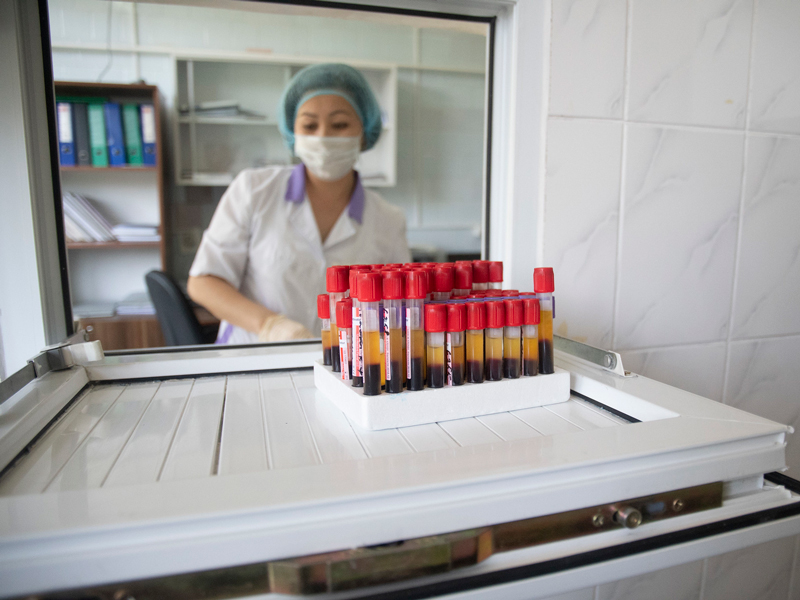ICAP at Columbia University, with support from the U.S. Centers for Disease Control and Prevention (CDC), recently conducted a three-day workshop aimed at identifying, preparing for, and preventing major health risks in the Eastern Europe, Caucuses, and Central Asia (EECCA) region – a strategic effort to come together to get ahead of global health threats before they emerge.
The April 2022 workshop in Georgia was held in close collaboration with the CDC EECCA Regional Office, with participants from a range of health organizations and national ministries in Armenia, Azerbaijan, Georgia, Kazakhstan, Kyrgyzstan, Moldova, Tajikistan, and Uzbekistan. During the workshop, a series of surveys were conducted among participants to prioritize health threats in the region and discuss shared or complementary capabilities in addressing them.
Participants identified priority gaps and challenges in preventing, detecting, and responding to key regional health threats, including: 1) early detection and rapid response to emergence and spread of especially dangerous pathogens, 2) surveillance and rapid response to mitigate the spread of acute respiratory viral infections, 3) integrated surveillance of enteric pathogens, 4) development of antimicrobial resistance (AMR) data collection surveillance, 5) improved antibiotic use in humans and animals, 6) implementation of effective infection prevention and control (IPC), and 7) improved health care-associated infection (HAI) data surveillance and data sharing.
“It was important that we gather public health experts from different countries in Eastern Europe and Central Asia to have a facilitated discussion on key health risks and gaps in order to address those risks, as well as identify capacity building areas that could be addressed more effectively through regional cooperation,” said Dr. Anna Deryabina, ICAP’s regional director in Central Asia. “The consensus on priority regional health threats reached during this meeting provides us with a good foundation to develop more tailored regional initiatives.”
Participants of the workshop highlighted that one of the most productive ways to address health risks as a region would be to create and support regional communities of practices to facilitate routine sharing of experiences, documents, tools, and lessons learned across the region. These communities of practices could be complemented by regional training platforms aimed at developing and implementing template training programs for a variety of stakeholders. Additionally, workshop participants emphasized the need for high-level regional meetings and conferences to ensure political commitment and national stewardship, especially in areas related to IPC improvement, HAI surveillance, AMR response, and surveillance.
“We were given a chance to share our experiences and lessons learned, which is something we were not able to do in the past two years because of COVID-19,” said Dr. Nurbolot Usenbaev, deputy director of the Republican Center of Quarantine and Especially Dangerous Infections of the Ministry of Health of the Kyrgyz Republic. “We have a lot to take away back to our colleagues.”
Dr. Zaure Akhmetova, deputy head of the Sanitary and Epidemiological Control Committee of the Ministry of Health of the Republic of Kazakhstan, added, “Countries in the region move at their own pace and directions, but we still face common challenges. We have good public health systems in the region, but as in many other parts around the world, we were not ready for COVID-19. We need regional cooperation to strengthen our ability to predict and respond to these kinds of events.”
In 2021, ICAP was awarded two new five-year projects supported by CDC to work with host government ministries of health to advance key Global Health Security (GHS) priorities. In addition to its project aimed at addressing challenges in GHS capacity in the EECCA region, ICAP was also awarded a project focused on the “One Health” approach, which advances coordinated surveillance across the public health, animal health, and environmental health sectors.
About ICAP
A major global health organization that has been improving public health in countries around the world for nearly two decades, ICAP works to transform the health of populations through innovation, science, and global collaboration. Based at Columbia Mailman School of Public Health, ICAP has projects in more than 30 countries, working side-by-side with ministries of health and local governmental, non-governmental, academic, and community partners to confront some of the world’s greatest health challenges. Through evidence-informed programs, meaningful research, tailored technical assistance, effective training and education programs, and rigorous surveillance to measure and evaluate the impact of public health interventions, ICAP aims to realize a global vision of healthy people, empowered communities, and thriving societies. Online at icap.columbia.edu








